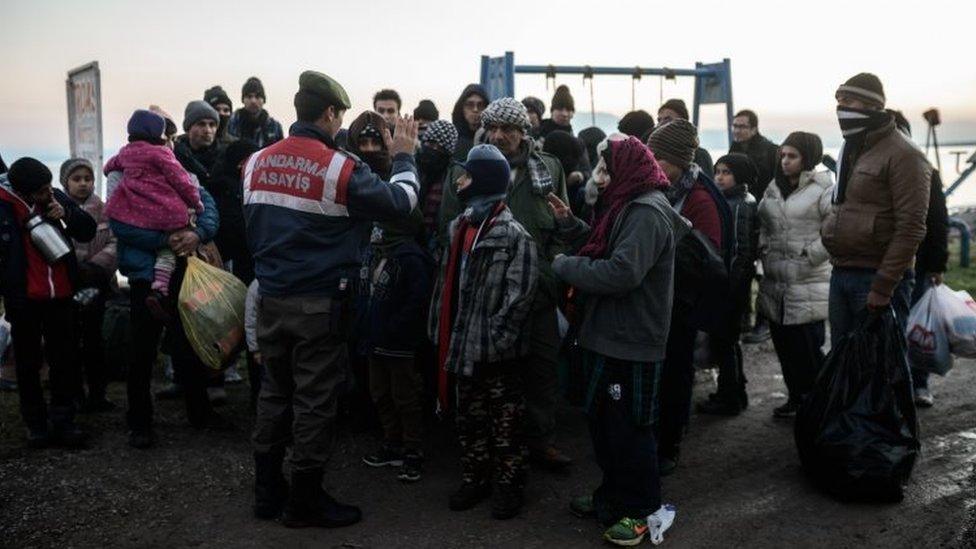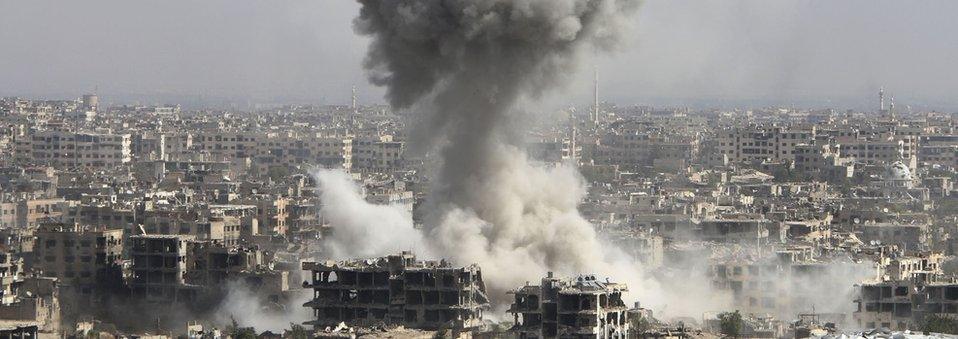Syria civil war: Up to 70,000 refugees head to Turkey, says PM
- Published
A local news agency filmed thousands of people heading to Turkey's border, as Bridget Kendall reports
Tens of thousands of Syrian refugees are moving to Turkey's border to flee heavy fighting near the city of Aleppo, officials and activists have said.
Turkish Prime Minister Ahmet Davutoglu said up to 70,000 might be heading to the border, while a monitoring group put the number at about 40,000.
Intense Russian air strikes have helped Syria's government troops make advances near the country's largest city.
Meanwhile, Russia accused Turkey of preparing an invasion into Syria.
Also on Thursday, a Saudi military spokesman said the country was ready to send ground troops to Syria to fight the so-called Islamic State group.

Many thousands of Syrian refugees have already entered Turkey illegally
Any decision would have to be accepted by leaders of the US-led coalition during a meeting in Brussels next month, Saudi Brig Gen Ahmad Bin-Hasan al-Asiri told the Associated Press news agency.
The offer was welcomed by US Defence Secretary Ash Carter, who said that he would discuss the issue with the Saudi defence minister in Brussels next week.
In other developments:
Twenty-one civilians were killed in Russian strikes on rebel-held districts of Aleppo, the UK-based Syrian Observatory for Human Rights said. The claim has not been independently verified
A spokesman for aid group Mercy Corps, David Evans, said the main humanitarian route to Aleppo was now cut off, adding: "It feels like a siege of Aleppo is about to begin"
At a donor conference, external for Syria, the EU promised more than $3.3bn (€3bn; £2.3bn) in aid - Germany pledged $2.6bn, the UK $1.7bn and the US $925m
But the pledges were overshadowed by the suspension of peace talks in Geneva
'War crimes'
Speaking at the donor conference in London, Mr Davutoglu said: "Now 10,000 new refugees are waiting in front of the door of Kilis (Turkey's border town) because of air bombardment and attacks against Aleppo."
He added that 60,000-70,000 people "in the camps in north Aleppo are moving towards Turkey". The Observatory put the number at about 40,000.
However, a BBC correspondent at the Kilis border crossing on Friday said there was no indication yet of large numbers of refugees on either side of the crossing.
Mark Lowen said that were reports however that 2,000 Syrian refugees were either waiting out of sight or had moved elsewhere.
In a related development, Turkey said it had activated an emergency protocol allowing for the rapid processing of refugees.
A similar protocol was enacted during the siege of Kobane last year when around 200,000 refugees crossed the border.
Rami Ruhayem reports from Damascus on the Syrian children displaced within their own country
Mr Davutoglu also condemned Russia's involvement in Syria, saying that both Moscow and the Syrian government of President Bashar al-Assad were guilty of war crimes.
Both Moscow and Damascus have repeatedly rejected such accusations.
Turkey is clearly incensed by the extent of the military support Russia is giving its ally - the government forces of President Assad, the BBC World Service's Middle East editor Alan Johnston says.
Russia's defence ministry said that since 1 February it had hit 875 "terrorist objects in the Aleppo, Latakia, Homs, Hama and Deir ez-Zor provinces".
This helped the Syrian army to cut the main rebel supply from the Turkish border to Aleppo, according to reports.
Nato Secretary-General Jens Stoltenberg said Russia's strikes against opposition forces were "undermining efforts to find a political solution to this conflict".
The rebel siege of the towns of Nubul and Zahraa, northern Aleppo province, has now been broken, the government in Damascus said.

Separately, Russian defence ministry spokesman Igor Konashenkov said Moscow "has reasonable grounds to suspect intensive preparation of Turkey for a military invasion" into Syria.
He added that Russia had already presented "incontrovertible video evidence" which reportedly showed Turkish shelling of Syria.
Ankara has not publicly commented on the claim.

Middle East press reaction
The Middle Eastern press carries some positive comment on the outcome of the Syria donors' conference in London. However, they also say that it shows the Syrian crisis is expected to last for a long time and needs a political solution.
Kuwait's Al-Qabas praises the "generous assistance" pledged, but highlights the Kuwaiti emir's remarks that "the humanitarian tragedy will not end until a political solution that puts an end to bloodshed is found."
An editorial in Qatar's Al-Rayah says what's needed is not just support for the Syrian people, but rescuing them from what it terms the "systematic genocide committed by the regime, and the countries and sectarian militias that support it."

Tensions between Turkey and Russia have escalated since Turkish fighter jets shot down a Russian bomber last November.
Ankara said it acted after the aircraft violated Turkey's air space - but Russia insisted the plane was shot down over Syria.
More than 250,000 people have died in almost five years of war in Syria.
Eleven million others have fled their homes as forces loyal to President Bashar al-Assad and those opposed to his rule battle each other, as well as IS jihadists.

What is the Syria conflict?

Why is there a war in Syria?
Anti-government protests developed into a civil war that, four years on, has ground to a stalemate, with the Assad government, the so-called Islamic State group, an array of Syrian rebels and Kurdish fighters all holding territory.
Who is fighting whom?
Government forces concentrated in Damascus and the centre and west of Syria are fighting the jihadists of Islamic State and al-Nusra Front, as well as less numerous so-called "moderate" rebel groups, who are strongest in the north and east. These groups are also battling each other.
How has the world reacted?
Iran, Russia and Lebanon's Hezbollah movement are propping up the Alawite-led Assad government, while Turkey, Saudi Arabia and Qatar back the more moderate Sunni-dominated opposition, along with the US, UK and France. Hezbollah and Iran are believed to have troops and officers on the ground, while a Western-led coalition and Russia are carrying out air strikes.
